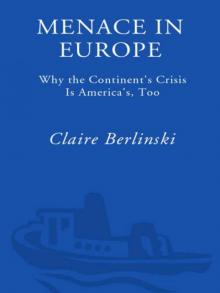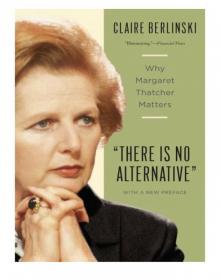- Home
- Claire Berlinski
There is No Alternative Page 2
There is No Alternative Read online
Page 2
In reviewing the first edition of this book, Theodore Dalrymple suggested a criticism that I thought excessively pessimistic at the time, but I fear now may be correct:Unfortunately, [Mrs. Thatcher] did not so much restore a market economy as promote a consumer society, which is not quite the same thing. It was a society in which most of the really difficult aspects of existence in the modern world—education, health care, social security and many others—remained in the hands of the state. This meant that consumer choice was largely limited to matters of pocket money: whether to ruin Ibiza by your behavior on holiday, or Crete. The resultant combination of consumer choice and deep irresponsibility was not an attractive one, to say the least. A large part of the population became selfish, egotistical, childish, petulant, demanding and whimsical.
I am not as dour by nature as Dr. Dalrymple, but I am open to the possibility that he’s right. If so, it suggests to me a terrible question: Is this the inevitable trajectory of open societies and market economies?
There is some evidence that it is: Every time I return to America, the culture seems to me more childish and self-absorbed. But then again, every time I return, I’m older. Honestly, I do not know, and neither does anyone: The future is hard to predict.
But America’s inability to produce politicians who both speak to the electorate and speak like adults, particularly about foreign policy, is an alarming sign. In that regard, the difference between Thatcher and any politician now alive seems quite stark. By now many politicians are willing to make one of Thatcher’s key arguments: nothing is possible without economic growth; absent a vibrant economy, there can be no effective foreign policy. Nor, for that matter, can social welfare programs be preserved. But Thatcher never pretended to the electorate that one might just ignore the rest of the world without consequence. The retreat of the United States into an isolationism characterized by indifference certainly cannot be justified by anything Thatcher said, did, or believed.
The isolationism is as profound among those who claim to reject it as it is among those who endorse it. It is illustrated by the lack of serious discussion about foreign and defense policy even among those who claim to be robust proponents of American leadership abroad. The first Republican candidate debate at Ames lasted for two hours. Of these, eight minutes—at the end of the debate—concerned foreign policy; not one serious argument was made about it.
To read an American newspaper is to feel that most of the world has dropped off the map. Serious coverage of the Middle East—the most unstable region of the world—has been ceded to Al Jazeera; the mainstream American press contains almost no foreign news. If the media no longer concerns itself seriously with the rest of the world, they cannot entirely be faulted for it: You can’t sell a product for which there is no demand.
The depth and severity of the economic crisis in the West and the exposure of the real level of corruption, the crony capitalism, and the sheer incompetence of its leadership have tested my confidence. I have no doubt that free markets, sovereign states, limited government, and constitutional democracy have produced the most creative, free, and just societies ever known. But can states thus constituted stay that way? If the high point of Western power, competence, and confidence has passed, I suppose the answer is “no.”
Thatcher’s hatred of socialism was ideological, as I wrote, but it was also personal: It was her country in decline. When I note that the United States is economically stagnant, debt-bound, heavily regulated, bureaucratic, less self-governing, less free, shallow, childish, incurious, self-indulgent, self-absorbed, illiterate, obese, and moribund, I am hardly able to be dispassionate about this. When I note as well that pockets of great entrepreneurial dynamism and talent remain, that my country has a proven history of self-renewal, that nothing is written, and that the world is apt to be a very dark place without it, I am not saying this out of mere academic curiosity.
It is hard now to look at the West with perfect optimism and confidence. But we must, for as Dr. Johnson remarked, reformation is necessary, and despair is criminal. Margaret Thatcher was never tempted by despair. I doubt that she would be now, either.
PREFACE TO THE PREVIOUS EDITION
This is not a conventional biography of Margaret Thatcher. I do not chronicle her life from cradle to coffin. Nor is this an insider’s memoir. Although I lived in Britain during the latter half of the Thatcher era, I did not know her and have not met her. I have created my portrait of her from biographies, from archival documents, and above all from speaking to people who did know her.
She is one of the most controversial figures of the second half of the twentieth century—worshipped, loathed, feted, mocked, her significance alternately exaggerated beyond reason and scornfully dismissed, sometimes by the same person in the same sentence. Everyone connected to her, it seems, has his or her own vividly imagined and almost supernatural Margaret Thatcher. No two Thatchers are exactly alike. I emphasize in this book the divergence of views about her rather than the similarities. I also emphasize the historiographical challenges of judging her impact upon Britain and the world. I do this not to advance an obscure postmodern thesis, but to illustrate the complexity of her personality and legacy.
My own view? I find her fascinating. I believe she was enormously significant. In fact, I believe she changed the world, and mostly for the better. I am nonetheless skeptical of some of the more hagiographic claims made on her behalf. But if this book is not a single-minded defense of Thatcher, this is in part because there is no need for one. She was, after all—far more than most people—exceptionally capable of defending herself. She has done so very ably in her autobiography. When she passes, the army of her devout will carry the torch and will need no help from me.
My aim instead has been to offer a portrait, seen through a prism, of an extraordinary personality and towering historical figure—a woman whose influence extends far beyond Great Britain and far beyond her moment in power.
I have also attempted to answer two questions. How do some people become larger than life?
And why, in particular, did she?
1
The Shrine of Mother Margaret
REPUBLICANS FLOCK TO SEE THATCHER IN
HOPES OF SECURING THE PRESIDENCY
By TOBY HARNDEN
Daily Telegraph
July 27, 2007
WASHINGTON—Republican presidential candidates are flocking to see Britain’s icon of conservatism, Margaret Thatcher, in the hope that her blessing could help to secure them the presidency.
Rudy Giuliani, the Republican front runner, will become the latest 2008 candidate to kiss the former prime minister’s hand when he travels to London in September to deliver the inaugural Margaret Thatcher memorial lecture to the Atlantic Bridge think tank. He follows in the footsteps of Fred Thompson, poised to announce his presidential run and already running second in the polls, and Mitt Romney, ahead in the crucial early states of Iowa and New Hampshire.
Mr. Thompson, a former senator and Hollywood actor, dropped in on her in London last month, saying he wanted “to remind her of America’s affection for her and pay our respects.” Mr. Romney took the opportunity to burnish his conservative credentials with a Lady Thatcher audience last fall. It is Mr. Giuliani, however, who is perhaps best placed to capitalize on nostalgia in America for Lady Thatcher and her close friendship with Ronald Reagan, who is still lauded for winning the Cold War and restoring hope and confidence in the country.
Several weeks before the article above was published, I too was in London, chatting with Sir Bernard Ingham about his memories of Margaret Thatcher. Sir Bernard spent the years from 1979 to 1990—almost all of her time in power—as her chief press secretary at 10 Downing Street. He saw everything.
I joined him for coffee at the Institute of Directors on Pall Mall, a street of elite gentlemen’s clubs in the heart of London. Most of these clubs now admit women, but this is a recent development. Nearby, the archly Tory Carlton Club maintains its traditiona
l gentlemen-only policy. Its members were in an awkward position when Margaret Thatcher was elected, for London’s preeminent Conservative club could hardly exclude a Conservative prime minister, but conservatives—in the technical sense of the word—couldn’t rush about changing things with every passing fad. At last they settled upon a solution. They declared her an honorary gentleman.
The Institute of Directors is a grand, flag-waving London landmark. Its marmoreal Doric and Corinthian columns sprout arris-beads of laurel leaves; gas-flambeaux lamps line up like solemn soldiers along its stone balustrades. These days, the members of the club are, as its name suggests, captains of industry, but the Institute was once the United Services Club, and its membership, according to Dickens’s Dictionary of London, was restricted to “officers not under the rank of commander in the navy, or major in the army.” Inside, the marble busts of long-forgotten noblemen commune quietly with oil portraits of their long-forgotten friends, reminiscing about the Crimean War, appalled by the sight of businessmen scuttling about the club with their ghastly cell phones, looking as if they’d have no idea which end of the rifle to shoot from.
Sir Bernard and I are sitting in the Morning Room, where we chat for a while about Britain before Thatcher (“totally shabby”) and the privatization of British industries (“astonishingly successful”). He is a bluff, meat-featured man who becomes passionately exercised at the thought of the British Left—“a nasty, scheming lot, crawling out of their holes in the grrrrrrround!”—and when he says this his voice booms and his brandy jowls shake and his Rs rrrrrrroll in the manner of a Yorkshire clergyman on the pulpit. He was and is Thatcher’s devoutly loyal friend. But he hardly strives to conceal the degree of her current infirmity.
Bernard Ingham: Her memory is so unreliable now—
[Waiter interrupts]
Waiter: There we are, Sir!
BI: Thank you very much. I mean, she doesn’t have a short-term memory anymore!
CB: Is that so? Because I’ve heard conflicting accounts of this—
BI: No, she doesn’t.
CB: That’s very sad.
BI: Yes. [To waiter] Thank you. Do you take milk or not?
CB: I do. Thank you. I suppose that’s why she doesn’t give interviews . . . she’s really not—
BI: She’s not up to it.
CB: I had heard from, I don’t know if you know Ambassador Middendorf,1 who was a friend of hers, the American ambassador to Belgium during her time in power; he spoke to her last year and reported that she was in wonderful form, so I had hoped that perhaps the reports of her incapacity were exaggerated, but I guess—
BI: Well, she can be in wonderful form, if you only have her for five minutes! HAH! HAH! HAH!
I believe Sir Bernard. He has no reason to exaggerate. Others who visit her regularly told me the same, in so many words. When I called her office at the House of Lords to see if it might be possible to meet her, her secretary politely told me I shouldn’t even dream of it.
Thatcher has now had several strokes. On good days, say her oldest friends, she remembers who they are. Sir Bernard visits her faithfully, and when he does he pretends to brief her on the issues of the moment, the way he used to when she was the most powerful woman in the world. She enjoys this but often can’t remember how the conversation began.
Given this, you have to ask: What could Rudy Giuliani hope to gain from a discussion with her? I have been told that she does at least recognize Giuliani, but I can only imagine that her response to the sight of Fred Thompson would be mystification. Was he accompanied by his spectacular young wife, the one who is always photographed in plunging décolletage? Thompson used to be an actor, like Thatcher’s great friend Ronald Reagan. Perhaps he mentioned this to her, hoping to suggest that he, like Reagan, could readily slip into the role of leader of the Free World. I cannot imagine he got very far. Thatcher, said the satirists, stood for a Britain that was “proud, profitable and ever so prim.” Whatever one may think about Nancy Reagan, she did not inspire jokes about pole dancing.
No, I doubt these meetings are greatly edifying to any party concerned. So why are they taking place? Why do the most ambitious men in America traverse the ocean to kiss her hand? Why is it she who grants them an audience? Why is her answer to the question Who, in your opinion, should lead the most powerful nation in the world? not only important to Americans, but somehow sanctified in a way no other living person’s could be?
Why has Margaret Thatcher become a living shrine?
The answer to this question has three parts.
First, Margaret Thatcher was one of the most vigorous, determined, and successful enemies of socialism the world has known.
There are as many species of socialism as there are species of insects, and Thatcher loathed them all. I use the word “socialism” here as a shorthand for a system of government in which property is largely owned or controlled by the state, rather than by individual citizens, and in which wealth is redistributed to create a more egalitarian society. Equality is the ideal, coerced redistribution the means, the state the agent. I also use the word “socialism” to compass both weak and extreme versions of this system. Britain before Thatcher was a weakly socialist nation in that many of its major industries and utilities were nationalized and rates of taxation high—and by “high” I mean really high, with top rates of 98 percent—but most private property rights remained. In the Soviet Union, almost no private property rights remained. I use the word “communism” to refer to the latter system, which I classify as a species of socialism.2
It is almost hard to remember now, but it must be remembered that when Thatcher came to power, in 1979, socialism, communism, and doctrinal Marxism were still taken extremely seriously, not only in the Eastern bloc but in much of the West and the developing world. The Soviet Union presided over a vast, miserable, subjugated empire. The 1970s had been a banner decade for international communism: In Southeast Asia, communist regimes had seized Cambodia, Laos, and South Vietnam; pro-Soviet factions had captured Afghanistan, Angola, Ethiopia, Grenada, Mozambique, Nicaragua, and South Yemen. Spain and Portugal were lurching leftward.
Britain’s Labour Party, which since the inter-war period had either been in power or been by far the largest party in opposition, remained committed to Clause 4 of its constitution:4. To secure for the workers by hand or by brain the full fruits of their industry and the most equitable distribution thereof that may be possible upon the basis of the common ownership of the means of production, distribution and exchange, and the best obtainable system of popular administration and control of each industry or service.
I repeat: common ownership of the means of production, distribution and exchange. Although these words were written in 1918, they are not ancient history. Clause 4 was not abandoned until 1995, two years before Labour Prime Minister Tony Blair took power. Unless you are still in elementary school, you were alive when this was the official platform of what is now Britain’s ruling party.
The final decade of the twentieth century was marked by a dramatic, global disenchantment with Marxist theory and experiments. This disenchantment had many causes, not least among them the poverty of the theory and the failure of the experiments, but Thatcher’s anti-socialist revolution in Britain, combined with the impact of her personality on the international stage, contributed to it significantly. By setting a domestic example of socialism reversed, she proved a point: The forces of history did not inevitably lead to socialism, as Marx had predicted, nor was it true that once socialism arrived, there could be no going back. She thus prompted observers around the world to ask a crucial question: Why must we have socialism? After all, Britain got rid of it.
The Soviet Union collapsed in 1989. The Warsaw Pact countries adopted broadly capitalist forms of government. By the end of the 1980s, more than fifty countries on every inhabited continent—Jamaica, Japan, Malaysia, Mexico, New Zealand, Pakistan, the Philippines, Sri Lanka, Singapore, Turkey—had set in motion privatization
programs. Countries that remained nominally committed to socialism, such as China and Vietnam, discreetly reduced their public sector. Even the United States took its cues from Thatcher, embarking on schemes to denationalize public monopolies. In 2001, Peter Mandelson, a Labour MP closely associated with Tony Blair, famously said, “We are all Thatcherites now.” The current Labour prime minister, Gordon Brown, once her sworn enemy, has recently decided that in fact he is a politician in her mold.3
Thatcher’s role in the great disenchantment was not limited to setting an example in Britain and encouraging others to follow suit. What she managed to do, more effectively than any other politician in history—including Ronald Reagan—was convey a very particular message about socialism. It was not only that socialism was an economically inefficient way to organize human societies. It was not only that communist regimes had in the twentieth century drenched the world in blood. It was that socialism itself—in all its incarnations, wherever and however it was applied—was morally corrupting. Socialism turned good citizens into bad ones; it turned strong nations into weak ones; it promoted vice and discouraged virtue; and even when it did not lead directly to the Gulags, it transformed formerly hardworking and self-reliant men and women into whining, weak and flabby loafers. Socialism was not a fine idea that had been misapplied; it was an inherently wicked idea. This was Thatcher’s signal contribution to the debate. It was a point she emphasized again and again: “In the end, the real case against socialism is not its economic inefficiency, though on all sides there is evidence of that. Much more fundamental is its basic immorality.”4

 Lion Eyes
Lion Eyes Menace in Europe: Why the Continent's Crisis Is America's, Too
Menace in Europe: Why the Continent's Crisis Is America's, Too Loose Lips
Loose Lips There is No Alternative
There is No Alternative